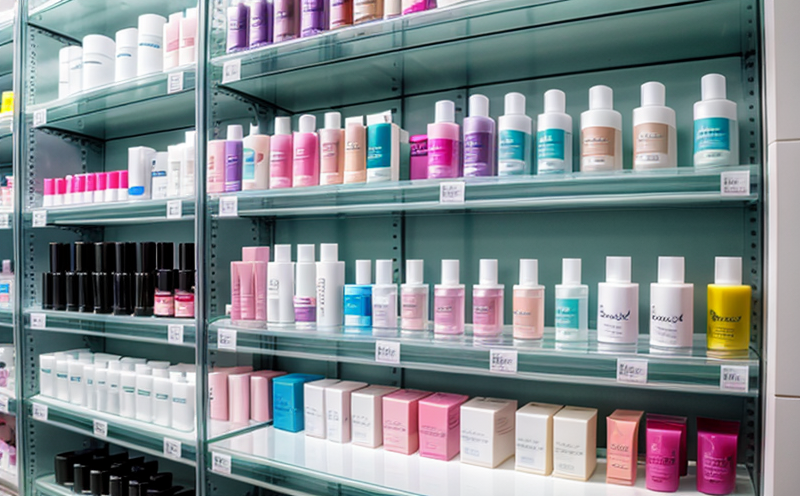pH Drift Testing in Cosmetic Shelf Life Studies
The stability and shelf life of cosmetic formulations are critical factors that determine product safety, efficacy, and overall quality. pH drift testing plays a pivotal role in ensuring these products meet consumer expectations and regulatory standards throughout their shelf life. This service evaluates how the pH of a cosmetic formulation changes over time under various environmental conditions. Understanding this parameter is essential for predicting the longevity of the product and preventing potential issues that could arise from excessive or rapid pH variations.
During this testing process, samples are exposed to controlled environmental stressors such as temperature, humidity, light, and storage duration. The goal is to simulate real-world conditions while closely monitoring the formulation's pH levels at regular intervals. This allows for a comprehensive assessment of how well the product can maintain its intended characteristics over time.
For instance, many cosmetic products contain active ingredients that are sensitive to changes in pH. If these shifts occur too quickly or exceed acceptable limits, it could compromise both the effectiveness and safety of the product. By conducting rigorous pH drift tests, manufacturers gain valuable insights into their formulations' stability, which helps them optimize production processes and extend shelf life.
The methodology for performing pH drift testing involves several steps. Initially, samples are prepared according to standard procedures specified by relevant international standards like ISO 2589:2017 or ASTM F344-18. These guidelines ensure consistent sample preparation across different laboratories, thereby enhancing comparability of results.
Once the samples have been correctly prepared, they undergo exposure to specific environmental conditions designed to mimic realistic storage scenarios. Temperature ranges typically span from room temperature up to 50°C, while humidity levels may vary between 20% and 80%. Additionally, light exposure is also a key factor considered during testing.
After exposing the samples to these controlled environments for predetermined durations (which can range anywhere from weeks to months depending on the product type), pH measurements are taken using high-precision equipment such as potentiometric meters. It’s important that this measurement process adheres strictly to established protocols to avoid any potential discrepancies in results.
Following completion of all exposures and corresponding pH readings, data analysis takes place. This involves comparing initial baseline values against those collected post-exposure to identify any significant changes indicative of pH drift. Based on these findings, recommendations are made regarding appropriate storage conditions and potential adjustments needed within the formulation itself to enhance stability.
This service provides more than just a snapshot in time; it offers long-term insight into how cosmetic products behave under various stressors over extended periods. This information is invaluable for companies looking to produce high-quality cosmetics that remain effective and safe throughout their shelf life, thereby enhancing consumer satisfaction and compliance with regulatory requirements.
Benefits
- Enhanced Product Quality: Ensures consistent product quality by identifying potential issues early on in the development process.
- Informed Decision Making: Provides valuable data to support informed decisions about formulation adjustments and optimal packaging materials.
- Regulatory Compliance: Helps meet stringent regulatory requirements governing cosmetic safety and efficacy.
- Consumer Confidence: Builds trust with consumers by delivering products that are reliable and safe over extended periods.
By incorporating pH drift testing into their quality assurance protocols, companies can significantly improve the reliability and performance of their cosmetic formulations. This leads to enhanced customer satisfaction and loyalty, ultimately contributing to stronger market positions.
International Acceptance and Recognition
- Inclusion in ISO Standards: The International Organization for Standardization (ISO) recognizes the importance of pH stability testing in its suite of standards related to cosmetic safety. ISO 2589 specifically addresses the measurement of pH values which are crucial during shelf life studies.
- ASTM Guidelines: Similarly, ASTM F344-18 outlines procedures for accelerated aging tests that include monitoring pH changes as part of comprehensive assessments.
These international standards provide a framework that ensures consistency and accuracy in performing pH drift tests. Compliance with these guidelines not only enhances the credibility of your testing results but also facilitates easier trade across borders since many countries recognize these internationally accepted methods.
Many regulatory bodies worldwide accept results from laboratories adhering to ISO or ASTM protocols, further emphasizing their importance within the global cosmetic industry. By leveraging such widely recognized standards in your pH drift testing procedures, you ensure that your findings are universally applicable and respected.
Environmental and Sustainability Contributions
In addition to its direct benefits for product quality and regulatory compliance, conducting thorough pH drift tests also contributes positively towards environmental sustainability efforts. By accurately predicting shelf life through rigorous testing, companies can reduce waste associated with expired products. This minimizes the amount of potentially hazardous materials ending up in landfills.
Moreover, optimizing formulations based on detailed pH stability data allows for more efficient resource utilization during manufacturing processes. For example, reducing unnecessary additives or preservatives that might otherwise degrade over time reduces both energy consumption and waste generation throughout the supply chain.
The ability to extend shelf life also translates into less frequent product replacements, thus lowering transportation emissions associated with shipping new goods. These environmental benefits align closely with broader sustainability goals pursued by many modern businesses aiming to minimize their ecological footprint.





